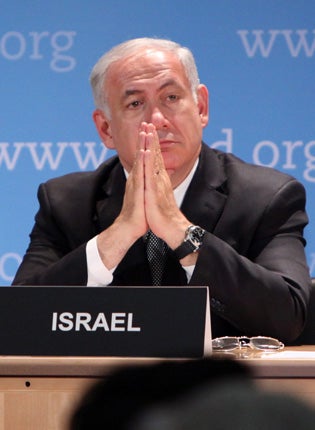Iran outflanks Israel in the dark arts of nuclear diplomacy

Your support helps us to tell the story
From reproductive rights to climate change to Big Tech, The Independent is on the ground when the story is developing. Whether it's investigating the financials of Elon Musk's pro-Trump PAC or producing our latest documentary, 'The A Word', which shines a light on the American women fighting for reproductive rights, we know how important it is to parse out the facts from the messaging.
At such a critical moment in US history, we need reporters on the ground. Your donation allows us to keep sending journalists to speak to both sides of the story.
The Independent is trusted by Americans across the entire political spectrum. And unlike many other quality news outlets, we choose not to lock Americans out of our reporting and analysis with paywalls. We believe quality journalism should be available to everyone, paid for by those who can afford it.
Your support makes all the difference.The Nuclear Non-proliferation Treaty, cornerstone of global disarmament efforts, has gained a new lease of life – but at the price of a small but telling diplomatic victory for Iran, and new strains between Israel and its most important ally, the US.
Unlike its predecessor in 2005, the regular five-yearly NPT review conference that wrapped up at the United Nations at the weekend this time did manage to produce a final resolution. The 189 signatories unanimously reaffirmed the treaty's basic bargain – that states with nuclear weapons will take steps to get rid of them (although once again no deadline is stipulated), while those that don't have them undertake not to do so.
But all of its most contentious parts affect Israel, not a signatory to the treaty and generally assumed to be a nuclear power, with anywhere between 100 and 300 warheads, even though it refuses to confirm or deny their existence.
Not only does the 28-page final document call for an international conference on a nuclear weapon-free Middle East, a long-standing goal of Arab countries, led by Egypt. It also specifically demands that Israel sign up to the NPT, and open its nuclear facilities to international inspection.
In a blistering response on Saturday, the Israeli government said it would ignore the resolution, describing it as "deeply flawed and hypocritical". Why single out Israel, it asked, when "the real problem with Weapons of Mass Destruction in the Middle East ... relates to those countries that have signed the NPT and brazenly violated it – Iraq under Saddam, Libya, Syria and Iran."
For this reason, the outcome of the review conference will be yet another irritant when Benjamin Netanyahu meets President Obama at the White House tomorrow. The Israeli prime minister's last visit to Washington was overshadowed by a row over the announcement of plans for new Israeli housing in East Jerusalem. This time, Mr Netanyahu will be complaining that the US could have blocked the NPT resolution and spared Israel a diplomatic defeat.
In reality there is next to no chance of a regional conference taking place by the target date of 2012, whatever the efforts of the "facilitator" to be appointed by the US, Russia, Britain and the UN Secretary General Ban Ki-moon. Hardly had the NPT deliberations concluded before Washington made clear that no Middle East conference could be held without a comprehensive peace treaty in the region first. "People are not going to come to a disarmament conference voluntarily if they are at war with their neighbours," said Ellen Tauscher, head of the US delegation at the UN talks.
Soon afterwards, Mr Obama issued a statement underlining his administration's "strong opposition" to efforts to single out Israel. Which raises the question: why did not Washington refuse to agree the resolution, which required unanimous endorsement to take effect?
In fact, the US was confronted with an unpalatable choice: not to support Israel, or be seen as wrecking a conference on one of the President's top priorities, preventing the spread of nuclear weapons, and hastening their reduction and ultimate elimination. In its statement, Israel suggested it had been mollified by "important clarifications" made by the White House on its attitude to the NPT. But the talks between Messrs Obama and Netanyahu are unlikely to be smooth sailing.
Iran, a signatory to the treaty, must reckon it has done well in New York. Nowhere is it mentioned by name. Had the US insisted the document do so, no resolution would have been possible. Not surprisingly the omission has infuriated Israel. It had been singled out, the Netanyahu government said, even though it was the Middle East's only true democracy and the only country in the region threatened with annihilation. Yet "the terrorist regime in Iran, which is racing to develop nuclear weapons, and which openly threatens to wipe Israel off the map, is not even mentioned".
Join our commenting forum
Join thought-provoking conversations, follow other Independent readers and see their replies
Comments